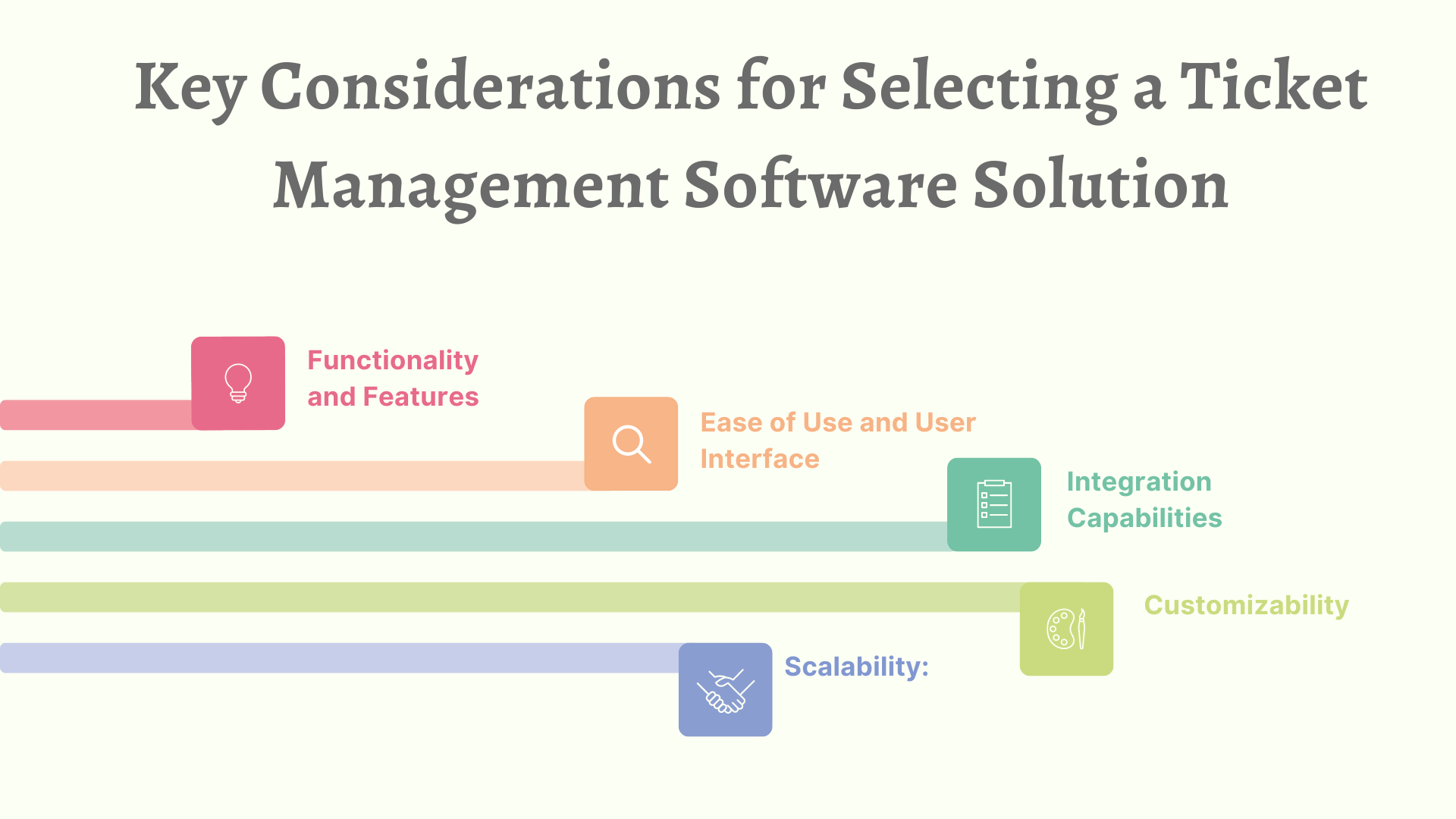
Home »
How Ticket Management Software Simplifies Your Workflow?
Experience streamlined workflows with ticket management software.
Introduction
One area where organizations often struggle to maintain smooth operations is ticket management. Whether it’s handling customer inquiries, internal support requests, or IT incidents, the process can quickly become overwhelming without a structured system in place.
Fortunately, ticket management software offers a comprehensive solution to this challenge. By centralizing and automating the entire ticketing process, businesses can experience a remarkable transformation in their workflow efficiency and resource utilization. In this article, we delve into the fundamental ways ticket management software simplifies your workflow, optimizing both internal operations and customer interactions.
Overview of Ticket management
Ticket management, also known as issue tracking or ticketing system, is a process and software solution used by organizations to effectively manage and track various types of requests, incidents, and tasks.
It is commonly employed in customer support, IT help desks, project management, and other service-oriented industries. The primary goal of ticket management is to streamline and organize the workflow, ensuring that every issue or task is addressed promptly and efficiently.
By streamlining the entire ticketing process, ticket management software optimizes the workflow, enables faster issue resolution, enhances customer satisfaction, and empowers organizations to provide exceptional support services. It is a critical tool for businesses of all sizes seeking to maintain operational efficiency and deliver top-quality services to their clients.

Key features and functionalities of ticket management software
The software allows users to create new tickets by submitting requests through various channels such as email, web forms, or customer portals. Each ticket is assigned a unique identifier and categorized based on its type, priority, and the department or team responsible for handling it.
Tickets are automatically assigned to the appropriate team members or agents based on predefined rules or manual assignment. The software tracks the progress of each ticket, providing real-time updates and notifications to both the requestor and support personnel.
Ticket management software allows users to set priority levels for different types of issues, ensuring that urgent matters receive immediate attention. It also helps organizations manage and enforce service level agreements (SLAs) by tracking response times and resolution deadlines.
If a ticket requires further attention or is not resolved within a specified time frame, the software can automatically escalate it to higher-level support personnel. Additionally, certain routine tasks can be automated to improve efficiency and reduce manual workload.
| KEBS Software Features | Description |
| Workflow & Approval Automation | Automates workflows and approval processes, reducing delays and ensuring automated approvals for increased efficiency. |
| Account 360 | Offers complete access to customer databases, enhancing understanding of customers and improving end-user experiences. |
| Proposal Builder | Includes a Proposal Builder tool for instant creation of customized proposals, increasing chances of successful conversions. |
| Sales Pipeline | Facilitates efficient deal management, optimizing the sales process and improving lead-to-conversion ratios. |
| Collaborative Forecasting | Supports collaborative forecasting for accurate sales revenue predictions, maximizing revenue and profit margins. |
Importance of streamlining Ticket management processes
Streamlining ticket management processes is of utmost importance for organizations that handle a significant volume of incoming requests and aim to provide efficient and high-quality customer support.
By streamlining ticket management processes, organizations can reduce manual and time-consuming tasks. Automation of ticket assignment, categorization, and prioritization ensures that tickets reach the right agents promptly, enabling faster response times and issue resolution.
A streamlined ticket management system ensures that customer inquiries and issues are addressed promptly and accurately. Customers receive quicker responses and resolutions, leading to higher satisfaction levels and a positive overall experience with the organization.
By automating and optimizing ticket allocation, organizations can allocate resources more efficiently. This results in better workload distribution among support agents, preventing bottlenecks and ensuring that critical issues are handled with the necessary attention. Streamlined ticket management provides real-time tracking and transparency throughout the entire ticket lifecycle. Both customers and support agents can view the ticket status and any updates, leading to better communication and a sense of accountability.
Benefits of Ticket Management Software
Ticket management software automates various aspects of the ticketing process, such as ticket creation, assignment, and escalation. This streamlines the workflow, reduces manual effort, and improves the overall efficiency of the support team.
With automated ticket routing and prioritization, support agents can address critical issues promptly. This leads to faster response times and quicker resolution of customer inquiries, enhancing overall customer satisfaction.
The software allows for better tracking and communication with customers throughout the ticket lifecycle. Customers receive updates on their tickets, know the status of their issues, and feel more informed and valued.
Ticket management software provides a centralized platform for handling all customer requests and support tickets. This helps prevent tickets from falling through the cracks and ensures that nothing gets overlooked.
Factors to consider when choosing a Ticket management software solution
When choosing a ticket management software solution for your organization, it’s essential to consider several factors to ensure you make the right decision.
- Functionality and Features: Assess the software’s features and functionalities to ensure it meets your specific ticket management needs. Look for features such as ticket creation and categorization, automation, SLA management, knowledge base integration, reporting, and collaboration tools.
- Ease of Use and User Interface: The software should have an intuitive and user-friendly interface that makes it easy for both support agents and customers to navigate and use the system effectively.
- Integration Capabilities: Check if the ticket management software can integrate with other tools and systems used in your organization, such as CRM software, project management tools, or communication platforms. Seamless integration ensures smooth data flow and avoids duplication of effort.
- Customizability: Consider if the software allows for customization to match your organization’s unique ticket management processes and requirements. The ability to tailor the system to your specific needs can greatly enhance its usefulness.
- Scalability: Ensure that the ticket management solution can scale with your organization’s growth. As your ticket volume increases, the software should be able to handle the load and accommodate your expanding support operations.

Best practices for using Ticket management software effectively
To use ticket management software effectively and get the most out of its capabilities, consider implementing the following best practices:
Define Clear Ticketing Processes: Establish well-defined ticketing processes that align with your organization’s support objectives. Clearly outline how tickets are created, categorized, assigned, escalated, and resolved. Standardizing these processes ensures consistency and streamlines the workflow.
Establish SLAs and Prioritize Tickets: Set clear Service Level Agreements (SLAs) for response and resolution times. Prioritize tickets based on urgency to ensure that critical issues receive immediate attention and are resolved promptly.
Monitor Performance Metrics: Regularly review and analyze performance metrics provided by the ticket management software. Monitor ticket volume, response times, resolution rates, and customer satisfaction to identify areas for improvement.
Optimize Workflows: Continuously review and optimize your ticket management workflows based on data insights and customer feedback. Look for bottlenecks or areas of inefficiency and implement changes to streamline the process.
Encourage Collaboration: Foster collaboration among support agents by using internal notes and communication tools within the ticketing system. This helps share knowledge, resolve complex issues, and maintain consistent responses.

Discussion of common challenges faced by organization
Ticket management, while highly beneficial, can also pose certain challenges for organizations. Some common challenges faced in terms of ticket management include:
- High Ticket Volume: Organizations with large customer bases or complex operations may experience a high volume of incoming tickets. Managing and prioritizing these tickets can be challenging, leading to potential delays in response and resolution times.
- Ticket Duplication: Customers might submit the same issue through multiple channels, leading to ticket duplication. Handling duplicate tickets can be time-consuming and may result in confusion or inefficiencies in the support process.
- Inconsistent Ticket Categorization: If tickets are not categorized properly, they might be routed to the wrong department or support agent. This can lead to delays in resolution and increased customer frustration.
- Manual Ticket Assignment: In some cases, tickets are manually assigned to support agents, which can be error-prone and may result in delays or miscommunication if the assignment process is not well-organized.
- Meeting SLAs: Adhering to service level agreements (SLAs) can be challenging, especially during peak periods or when ticket volumes are high. Failure to meet SLAs can negatively impact customer satisfaction and brand reputation.
- Customer Dissatisfaction: If tickets are not addressed in a timely and efficient manner, customers may become dissatisfied with the support provided, leading to churn or negative reviews.
To overcome these challenges, organizations should focus on streamlining their ticket management processes, implementing automation where possible, providing comprehensive training to support agents, and regularly monitoring performance metrics to identify areas for improvement. Effective ticket management can significantly enhance customer satisfaction and overall support team efficiency.
How KEBS helps to address the challenges?
KEBS, being a Professional Services Automation Software, offers a comprehensive set of features to help organizations address various challenges related to ticket management effectively. Let’s see how KEBS can assist in tackling the mentioned challenges:
- Team Inbox: KEBS provides a centralized Team Inbox where support agents can view and manage all incoming tickets. This helps in avoiding ticket duplication and ensures that all tickets are visible and handled promptly.
- Custom Fields & Workflow: KEBS allows organizations to customize ticket fields and workflows based on their specific requirements. This enables consistent ticket categorization and routing, reducing the risk of miscommunication or delays.
- SLA Tracker: KEBS includes a robust SLA Tracker that helps organizations monitor and adhere to their Service Level Agreements. This feature ensures that support agents prioritize tickets based on their urgency and meet response and resolution time commitments.
- Parent – Child Tickets: With the Parent – Child Tickets feature, KEBS enables agents to create relationships between related tickets. This is particularly useful for handling complex issues that require multiple interconnected tickets to be resolved.
- Escalation Matrix: KEBS offers an Escalation Matrix functionality that automatically escalates tickets to higher-level support personnel if they remain unresolved within specified timeframes. This ensures timely attention to critical issues.
- Skill-based Routing: KEBS allows for skill-based routing, where tickets are automatically assigned to support agents based on their expertise. This ensures that the right agents with the necessary skills handle each ticket, improving efficiency and accuracy.
- Feedback Collector: KEBS includes a Feedback Collector feature that gathers customer feedback on support interactions. This helps organizations gauge customer satisfaction and identify areas for improvement in their ticket management processes.
- Knowledge Base: KEBS offers a Knowledge Base integration, allowing organizations to create and maintain a repository of frequently asked questions and solutions. This empowers customers to find answers independently, reducing the number of support tickets.
- Task Management: KEBS enables task management, allowing support agents to create and track internal tasks related to ticket resolution. This helps in coordinating efforts and ensures nothing is overlooked during the support process.
By leveraging these features, KEBS provides organizations with a powerful and versatile ticket management solution. It streamlines workflows, improves collaboration, enhances customer support, and empowers organizations to address ticket management challenges effectively, leading to increased customer satisfaction and optimized support operations.

Conclusion
In conclusion, the implementation of Ticket Management Software, such as the cutting-edge KEBS platform, proves to be a transformative solution for organizations seeking to streamline their workflow and elevate customer support to unprecedented levels of efficiency and satisfaction.
Embrace KEBS and simplify your workflow today with KEBS!









